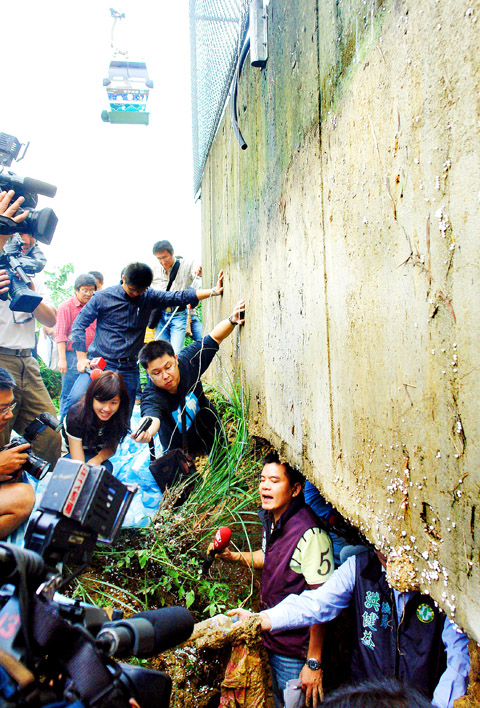Taipei Mayor Hau Lung-bin (郝龍斌) said yesterday the Maokong Gondola would be closed until civil engineers could confirm its safety after mud slides brought by Super Typhoon Jangmi eroded the ground beneath a support pillar.
The cable car was closed at 3pm yesterday and will not open for at least a month while the evaluation is conducted by a team that will be selected by the city government, Hau told a press conference.
The decision was an about-face from the city government’s announcement on Monday that the cable car would continue to operate in spite of protests from local residents and city councilors.

PHOTO: CNA
Hau yesterday said the system was safe, but that the evaluation would be conducted to ease public anxiety.
“The city government’s departments had concluded that the gondola was safe, but apparently our evaluation result did not resolve public concerns. In order to ease the worries of residents, we decided to suspend the gondola’s operations,” he said.
Hau said the city government would invite civil engineers to conduct a thorough inspection on the stability of the system. Service will not resume until the results are in.
When asked whether any city officials would resign over the incident, Hau declined to respond, but said the city government had closed the cable car because it “feels the public’s pain.”
Taipei City councilors across party lines questioned Hau’s guarantee that the gondola was safe, saying the torrential rains had left a 2.5m-deep hole a few meters from a support pillar on a cliff.
Jangmi caused mud slides in Muzha (木柵) on Monday, one of which occurred directly under the gondola’s Corner 2 station — one of two service stations where passengers do not board. Part of a cliff bearing two support pillars crumbled in the storm.
Standing inside the hole beneath the pillar during an inspection yesterday, Democratic Progressive Party Taipei City councilors Chuang Ruei-hsiung (莊瑞雄) and Chou Bo-ya (周柏雅) scooped up loose soil and trash such as plastic bags, saying it was ridiculous to call the pillar stable.
“How can this foundation be called stable and solid when rocks keep falling from the cliff? The city government is lying,” Chuang said.
Taipei City Secretariat Director Yang Hsi-an (楊錫安) said the system was “absolutely safe.”
The pillars are set into igneous rock beneath the surface, so the stability of the pillars is not affected if top soil erodes, Yang said.
In addition, more than 340 sensors placed in the gondola system’s support pillars ensure that the system will shut down automatically if any of the pillars tilt, he said.
“We have told the mayor that the system is fine and we continue to believe that the system is fine. Operations were halted to ease public concern,” he said.
Yang said suspending operations would cost the Taipei Rapid Transit Corporation (TRTC) more than NT$45 million (US$1.4 million) for a month.
TRTC, the operator of the gondola, will refund any tickets purchased in advance.

Alain Robert, known as the "French Spider-Man," praised Alex Honnold as exceptionally well-prepared after the US climber completed a free solo ascent of Taipei 101 yesterday. Robert said Honnold's ascent of the 508m-tall skyscraper in just more than one-and-a-half hours without using safety ropes or equipment was a remarkable achievement. "This is my life," he said in an interview conducted in French, adding that he liked the feeling of being "on the edge of danger." The 63-year-old Frenchman climbed Taipei 101 using ropes in December 2004, taking about four hours to reach the top. On a one-to-10 scale of difficulty, Robert said Taipei 101

Nipah virus infection is to be officially listed as a category 5 notifiable infectious disease in Taiwan in March, while clinical treatment guidelines are being formulated, the Centers for Disease Control (CDC) said yesterday. With Nipah infections being reported in other countries and considering its relatively high fatality rate, the centers on Jan. 16 announced that it would be listed as a notifiable infectious disease to bolster the nation’s systematic early warning system and increase public awareness, the CDC said. Bangladesh reported four fatal cases last year in separate districts, with three linked to raw date palm sap consumption, CDC Epidemic Intelligence

US climber Alex Honnold left Taiwan this morning a day after completing a free-solo ascent of Taipei 101, a feat that drew cheers from onlookers and gained widespread international attention. Honnold yesterday scaled the 101-story skyscraper without a rope or safety harness. The climb — the highest urban free-solo ascent ever attempted — took just more than 90 minutes and was streamed live on Netflix. It was covered by major international news outlets including CNN, the New York Times, the Guardian and the Wall Street Journal. As Honnold prepared to leave Taiwan today, he attracted a crowd when he and his wife, Sanni,

Taiwanese and US defense groups are collaborating to introduce deployable, semi-autonomous manufacturing systems for drones and components in a boost to the nation’s supply chain resilience. Taiwan’s G-Tech Optroelectronics Corp subsidiary GTOC and the US’ Aerkomm Inc on Friday announced an agreement with fellow US-based Firestorm Lab to adopt the latter’s xCell, a technology featuring 3D printers fitted in 6.1m container units. The systems enable aerial platforms and parts to be produced in high volumes from dispersed nodes capable of rapid redeployment, to minimize the risk of enemy strikes and to meet field requirements, they said. Firestorm chief technology officer Ian Muceus said